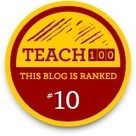Much of what passes for an “online course” these days could more accurately be described as the electronic version of class hand-outs. These courses usually consist of a course description, a syllabus, lecture notes, reading lists, and assignment checklists. In other words, whatever materials a student might have viewed on paper in the past are now read onscreen, and whatever presentations a student might have watched in the classroom are now observed on their screen. Read more Five Common Pitfalls of Online Course Design ›
Via SusanBat



 Your new post is loading...
Your new post is loading...











